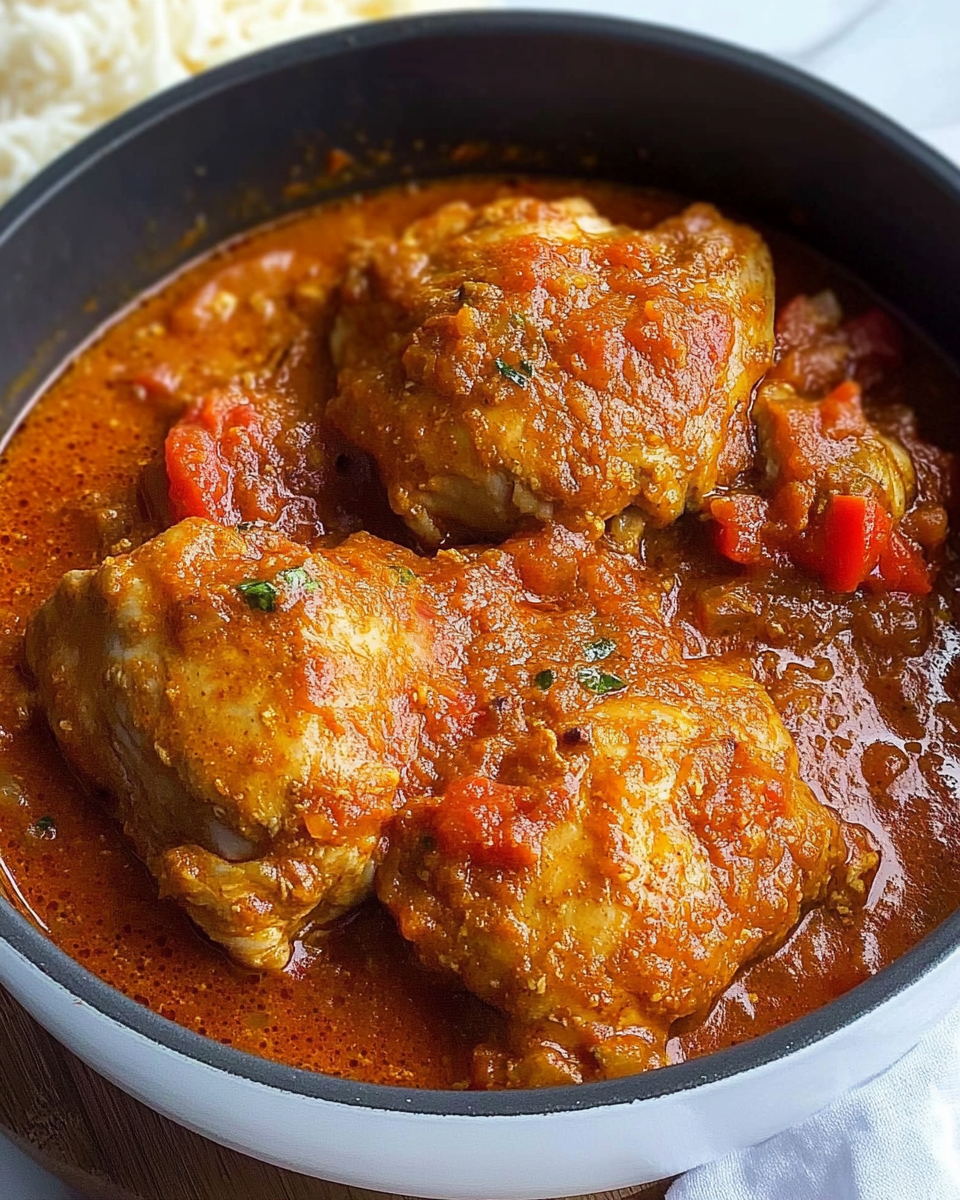The Nigerian Chicken Stew is a rich, savory dish deeply rooted in West African culinary traditions. Made with a base of blended red peppers, tomatoes, and onions, it’s simmered slowly with seared chicken until every bite is infused with intense flavor. It’s vibrant, hearty, and deeply satisfying. Perfect with cauliflower rice for a low-carb take or served traditionally with white rice or plantains, this stew brings the warmth and spice of Nigerian kitchens right to your table. With its deep red hue and inviting aroma, it’s a show-stopping dish perfect for everyday dinners or festive gatherings alike.
Full Recipe:
Ingredients:
-
2 lbs chicken thighs (bone-in, skinless)
-
1 red bell pepper
-
1 large tomato
-
1 habanero pepper (adjust to taste)
-
1 medium onion, divided
-
1/4 cup olive oil
-
2 tablespoons tomato paste
-
1 teaspoon thyme
-
1 teaspoon curry powder
-
1 teaspoon smoked paprika
-
1 bouillon cube (or 1 tsp bouillon powder)
-
Salt to taste
-
Water as needed
Directions:
-
Blend red bell pepper, tomato, habanero, and half the onion until smooth. Set aside.
-
Season chicken with salt, paprika, and curry powder. Set aside.
-
Heat olive oil in a large pot. Chop the remaining half onion and sauté until translucent.
-
Add the seasoned chicken and sear on both sides until browned (about 5 minutes per side). Remove and set aside.
-
Add tomato paste to the pot and fry for 2 minutes, stirring constantly.
-
Pour in the blended pepper mixture and cook on medium heat for 15 minutes, stirring occasionally.
-
Return chicken to the pot, add thyme and bouillon cube, and stir well.
-
Add a splash of water if needed for desired consistency. Simmer on low for 20–25 minutes until chicken is cooked through and tender.
-
Adjust seasoning to taste and serve hot.
Prep Time: 10 minutes | Cooking Time: 45 minutes | Total Time: 55 minutes
Kcal: 290 kcal | Servings: 6 servings
A Deep Dive into Nigerian Chicken Stew: A Flavorful West African Classic
Nigerian Chicken Stew is one of the most iconic and beloved dishes in Nigerian cuisine. Bold in flavor, rich in aroma, and vibrant in appearance, this hearty tomato-based chicken stew is more than just a meal it’s a celebration of culture, community, and culinary heritage. In this article, we explore everything you need to know about this irresistible dish: its cultural significance, nutritional benefits, versatility, and why it deserves a permanent place in your recipe collection.
The Cultural Roots of Nigerian Chicken Stew
Nigerian Chicken Stew is a cornerstone of traditional Nigerian cooking. It’s deeply woven into the culinary fabric of the country, often prepared for both everyday meals and festive occasions. Whether it’s a Sunday family lunch, a wedding celebration, or a festive holiday gathering, you can almost always expect to see a pot of this bubbling stew at the center of the table.
This dish highlights the significance of communal eating in Nigerian culture. Food is often shared family-style, served with a variety of sides like jollof rice, white rice, fried plantains, pounded yam, or even cauliflower rice for those on low-carb diets. It’s not just about nourishment; it’s about connection, hospitality, and tradition.
Why This Stew Stands Out
What sets Nigerian Chicken Stew apart is its distinct blend of ingredients and preparation method. The base of the stew a purée of red bell peppers, tomatoes, onions, and spicy habaneros is slowly simmered to develop depth and richness. This pepper mix forms the heart of many Nigerian stews and soups, giving them their signature bold color and flavor.
The chicken, often bone-in and skinless for maximum flavor and tenderness, is seared before being stewed. This technique locks in juices and infuses the meat with the spiced tomato sauce. The inclusion of warming spices like thyme, curry powder, and paprika further enhances the stew’s flavor profile.
The result is a deliciously comforting dish that’s tangy, spicy, and satisfyingly savory. The stew thickens beautifully and coats the chicken in a luscious sauce that begs to be soaked up with a side of rice or soft bread.
Versatility and Adaptability
One of the best things about Nigerian Chicken Stew is its adaptability. While the core ingredients remain relatively constant, home cooks often personalize the recipe based on regional traditions, dietary preferences, or ingredient availability.
For instance, you can easily swap chicken for other proteins such as goat meat, beef, or fish. Some people add vegetables like spinach or carrots to increase the stew’s nutritional value. Others might reduce or intensify the heat depending on personal spice tolerance.
And while the traditional version uses vegetable oil, low-carb or keto dieters can make the dish healthier by using olive oil or avocado oil. Even the side dishes can vary greatly—think yam, plantain, couscous, or a low-carb alternative like zucchini noodles.
A Nutrient-Rich, Low-Carb Friendly Dish
Nigerian Chicken Stew is not only delicious but also quite nutritious, making it suitable for a wide range of dietary plans. Rich in protein from the chicken, the stew also packs essential vitamins and antioxidants from tomatoes, peppers, and onions.
Those watching their carbohydrate intake will be happy to know that this dish is naturally low in carbs, especially when paired with alternatives like cauliflower rice or green vegetables. It’s also gluten-free and can be customized to fit paleo, keto, and Whole30 lifestyles.
Thanks to the use of healthy fats and an abundance of fresh produce, it offers a satisfying balance of macronutrients, making it a guilt-free comfort food that doesn’t compromise on taste.
Pairing Ideas for the Perfect Meal
Pairing Nigerian Chicken Stew with the right side dish elevates the experience even further. Here are some traditional and modern pairing suggestions:
-
White Rice – The most common pairing. The rice absorbs the flavorful stew beautifully.
-
Fried Plantains – Add a sweet contrast that complements the stew’s heat.
-
Yam or Sweet Potatoes – A hearty option that’s perfect for larger meals.
-
Cauliflower Rice or Shirataki Rice – A great low-carb alternative.
-
Couscous or Quinoa – Adds a nutty texture for a contemporary twist.
-
Flatbread or Naan – Excellent for soaking up every last drop of the sauce.
You can also serve the stew alongside other Nigerian classics like Moi Moi (steamed bean pudding), Egusi Soup, or Okra Soup for a full cultural experience.
Tips for Perfecting Nigerian Chicken Stew
-
Use Fresh Ingredients: The flavor of the stew hinges on the quality of your tomatoes and peppers. Fresh produce makes a noticeable difference.
-
Blend Smoothly: A high-speed blender ensures a smooth pepper base, which results in a more uniform and thick stew.
-
Fry the Tomato Base: Don’t rush this step. Cooking down the tomato blend eliminates excess water and intensifies the flavors.
-
Season Generously: Taste as you go and adjust spices and salt to your preference.
-
Use Bone-In Chicken: It adds more depth to the stew compared to boneless cuts.
Storing and Reheating
Nigerian Chicken Stew stores exceptionally well and actually tastes better the next day as the flavors continue to meld. You can refrigerate leftovers for up to 5 days or freeze for longer storage. Reheat gently on the stove or in the microwave, adding a splash of water or broth if the stew has thickened too much.
It’s a great meal-prep option for busy weeks and perfect for batch cooking.
Conclusion:
Nigerian Chicken Stew is more than just a dish it’s an expression of culture, warmth, and bold flavor. Whether you’re new to West African cuisine or a seasoned fan, this stew offers comfort, complexity, and culinary satisfaction in every spoonful.
Its versatility, health benefits, and irresistible taste make it a must-have recipe for anyone looking to explore global flavors or add more variety to their meal planning. Whether served traditionally or with modern, health-conscious twists, Nigerian Chicken Stew is sure to become a beloved staple in your kitchen.






